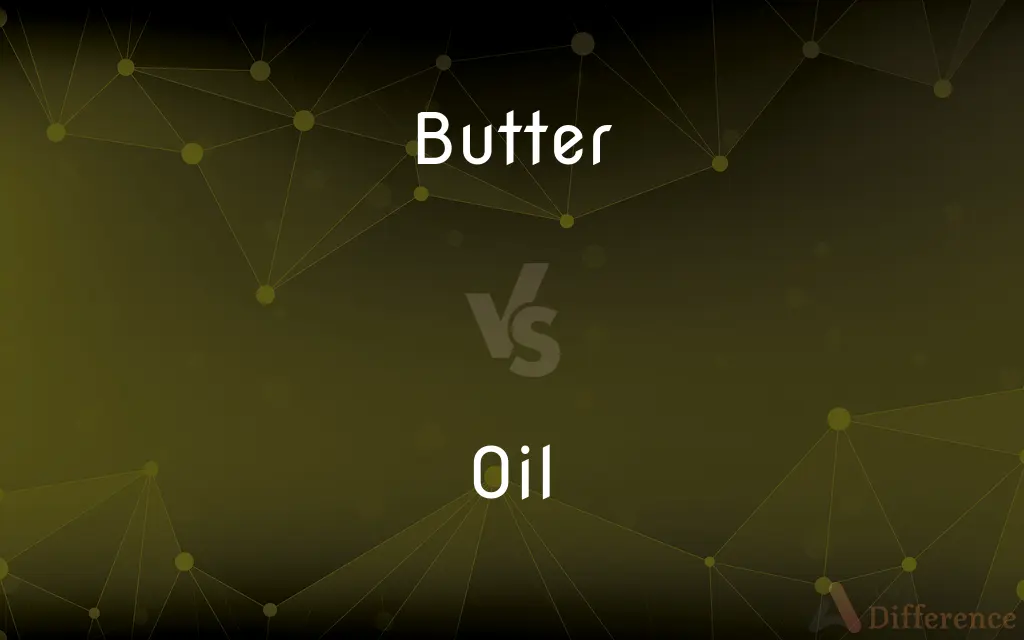Butter vs. Oil — What's the Difference?
By Tayyaba Rehman — Updated on October 30, 2023
Butter is a solid dairy product at room temperature, while Oil is plant-based and liquid at room temperature.

Difference Between Butter and Oil
Table of Contents
ADVERTISEMENT
Key Differences
Butter and Oil serve distinct roles in cooking and nutrition. Butter is a dairy product, made from churning cream, resulting in a solid fat rich in saturated fats and cholesterol. It imparts a creamy texture and rich flavor to dishes. In contrast, Oil, derived from various plants, seeds, or nuts, is a liquid at room temperature and contains unsaturated fats, often considered healthier. It's used for its ability to withstand high cooking temperatures and for adding moisture to dishes.
In terms of flavor and culinary uses, Butter and Oil diverge. Butter offers a distinct, rich taste and is often used for baking, sautéing, and as a spread. Its melting point lends a desirable texture to baked goods. Oil, on the other hand, has a more neutral taste or may carry the flavor of its source, like olive or coconut oil. It's ideal for frying, dressing, and cooking at high temperatures without burning.
Nutritionally, Butter and Oil provide different health profiles. Butter, high in saturated fat, has been associated with higher cholesterol levels, whereas many oils, particularly olive and canola, are rich in heart-healthy monounsaturated fats. However, not all oils are created equal; some, like palm and coconut oil, are also high in saturated fats.
The choice between Butter and Oil often comes down to dietary preferences and cooking requirements. Butter is a staple in baking, where its solid form contributes to the texture of pastries and cakes. Oil, with its varying smoke points, is more versatile for different cooking methods, from frying to drizzling over salads.
While Butter is primarily sourced from animal milk, primarily cows, Oil is derived from a wide range of plant sources. Each type of oil, such as olive, avocado, or sunflower, brings its unique flavor and properties, making it suitable for different culinary applications. Butter, with its uniform source, maintains a consistent profile, preferred for its flavor and texture in certain recipes.
ADVERTISEMENT
Comparison Chart
Source
Made from churned cream, usually cow's milk
Extracted from plants, seeds, or nuts
State at Room Temperature
Solid
Liquid
Fat Type
High in saturated fats
Varies, often high in unsaturated fats
Flavor
Rich, creamy
Neutral or varies depending on source
Cooking Usage
Baking, spreading, sautéing
Frying, dressing, high-temperature cooking
Health Considerations
Higher in cholesterol
Often considered healthier, varies by type
Smoke Point
Lower, can burn easily
Higher, varies by type
Compare with Definitions
Butter
Used as a cooking fat and flavor enhancer in recipes.
The recipe called for a tablespoon of butter for richness.
Oil
Commonly used for frying and cooking at high temperatures.
He heated the oil in the pan before adding the chicken.
Butter
A traditional spread for bread and other baked goods.
They served warm rolls with butter at the restaurant.
Oil
Has a higher smoke point compared to butter.
For deep-frying, she preferred using vegetable oil due to its high smoke point.
Butter
A solid dairy product made by churning cream.
She spread butter on her toast every morning.
Oil
An oil is any nonpolar chemical substance that is a viscous liquid at ambient temperatures and is both hydrophobic (does not mix with water, literally "water fearing") and lipophilic (mixes with other oils, literally "fat loving"). Oils have a high carbon and hydrogen content and are usually flammable and surface active.
Butter
Butter is a dairy product made from the fat and protein components of churned cream. It is a semi-solid emulsion at room temperature, consisting of approximately 80% butterfat.
Oil
A viscous liquid derived from petroleum, especially for use as a fuel or lubricant.
Butter
A pale yellow edible fatty substance made by churning cream and used as a spread or in cooking.
Oil
Oil paint
A portrait in oils
Butter
Spread (something) with butter
Lily buttered a slice of toast
Oil
Information or facts
Young had some good oil on the Adelaide races
Butter
A soft yellowish or whitish emulsion of butterfat, water, air, and sometimes salt, churned from milk or cream and processed for use in cooking and as a food.
Oil
Lubricate, coat, or impregnate with oil
A lightly oiled baking tray
Butter
A spread made from fruit, nuts, or other foods
Plum butter.
Cashew butter.
Oil
Supply with oil as fuel
Attempts should not be made to oil individual tanks too rapidly
Butter
A vegetable fat having a nearly solid consistency at ordinary temperatures.
Oil
Any of numerous mineral, vegetable, or synthetic substances or animal or vegetable fats that are generally slippery, combustible, viscous, liquid or liquefiable at room temperatures, soluble in various organic solvents such as ether but not in water, and used in a great variety of products, especially lubricants and fuels.
Butter
Flattery.
Oil
Petroleum.
Butter
To put butter on or in.
Oil
A petroleum derivative, such as a machine oil or lubricant.
Butter
A soft, fatty foodstuff made by churning the cream of milk (generally cow's milk).
Oil
A protective or cosmetic liquid applied to the skin or hair.
Butter
Any of various foodstuffs made from other foods or oils, similar in consistency to, eaten like or intended as a substitute for butter (preceded by the name of the food used to make it).
Peanut butter
Soy butter
Chocolate butter
Oil
Oil paint.
Butter
Any of various substances made from other (especially plant-based) oils or fats, used in moisturizers, cosmetics, etc.
Oil
A painting done in oil paint.
Butter
Any specific soft substance.
Butter of antimony; butter of arsenic
Oil
To lubricate, supply, cover, or polish with oil.
Butter
A smooth plane landing.
Oil
Liquid fat.
Butter
Someone who butts, or who butts in.
Oil
Petroleum-based liquid used as fuel or lubricant.
Butter
(transitive) To spread butter on.
Butter the toast.
Oil
Petroleum
Butter
To move one's weight backwards or forwards onto the tips or tails of one's skis or snowboard so only the tip or tail is in contact with the snow. Similar to applying butter to bread with then end of a butterknife.
Oil
(countable) An oil painting.
Butter
To spin on skis or a snowboard using only the tips or tails being in contact with the snow
Oil
(painting) Oil paint.
I prefer to paint in oil
Butter
To increase (stakes) at every throw of dice, or every game.
Oil
(attributive) Containing oil, conveying oil; intended for or capable of containing oil.
Oil barrel; oil pipe
Butter
Very smooth, very soft
That landing was total butter!
Oil
(transitive) To lubricate with oil.
Butter
An oily, unctuous substance obtained from cream or milk by churning.
Oil
(transitive) To grease with oil for cooking.
Butter
Any substance resembling butter in degree of consistence, or other qualities, especially, in old chemistry, the chlorides, as butter of antimony, sesquichloride of antimony; also, certain concrete fat oils remaining nearly solid at ordinary temperatures, as butter of cacao, vegetable butter, shea butter.
Oil
Any one of a great variety of unctuous combustible substances, more viscous than and not miscible with water; as, olive oil, whale oil, rock oil, etc. They are of animal, vegetable, or mineral origin and of varied composition, and they are variously used for food, for solvents, for anointing, lubrication, illumination, etc. By extension, any substance of an oily consistency; as, oil of vitriol.
Butter
One who, or that which, butts.
Oil
To smear or rub over with oil; to lubricate with oil; to anoint with oil.
Butter
To cover or spread with butter.
I know what's what. I know on which sideMy bread is buttered.
Oil
A slippery or viscous liquid or liquefiable substance not miscible with water
Butter
To increase, as stakes, at every throw or every game.
Oil
Oil paint used by an artist
Butter
An edible emulsion of fat globules made by churning milk or cream; for cooking and table use
Oil
Any of a group of liquid edible fats that are obtained from plants
Butter
A fighter who strikes the opponent with his head
Oil
Cover with oil, as if by rubbing;
Oil the wooden surface
Butter
Spread butter on;
Butter bread
Oil
Administer an oil or ointment to ; often in a religious ceremony of blessing
Butter
Commonly used in baking for texture and taste.
The cookies had a tender crumb thanks to the butter.
Oil
A liquid fat extracted from plants, seeds, or nuts.
She used olive oil for the salad dressing.
Butter
Can be unsalted or salted, affecting its culinary use.
He preferred using unsalted butter for more control over seasoning.
Oil
Varies in flavor and health benefits depending on the source.
Avocado oil is praised for its healthy fats.
Oil
Often used as a dressing or to add moisture to dishes.
The pasta was tossed in garlic-infused oil for extra flavor.
Common Curiosities
What is Oil?
A liquid fat extracted from plants, seeds, or nuts, used in various cooking methods.
Can Butter be used for frying?
Yes, but it has a lower smoke point and can burn easily.
Can Butter be substituted with Oil in recipes?
Sometimes, but it may affect the texture and flavor of the dish.
Are there different types of Oil?
Yes, including olive, canola, vegetable, coconut, and many others.
Is Butter used in salad dressings?
Rarely, as it solidifies when cold; oil is more commonly used.
Is Oil always vegan?
Yes, as it's derived from plant-based sources.
Does Butter need to be refrigerated?
Generally yes, to maintain its quality and prevent spoilage.
What is Butter?
A solid dairy product made from churned cream, used in cooking and as a spread.
Is Butter or Oil healthier?
It depends on the type of oil; some oils are healthier than butter, while others are not.
Can Oil be used in baking?
Yes, it's often used to add moisture to cakes and bread.
Does Butter have a strong flavor?
Yes, it imparts a rich, creamy flavor to dishes.
Is Oil good for high-heat cooking?
Yes, many oils have high smoke points suitable for high-heat methods.
Does the type of Oil affect the taste of a dish?
Yes, different oils can impart different flavors to dishes.
Can Oil be flavored?
Yes, oils can be infused with herbs, spices, or other flavors.
Can Butter be unsalted?
Yes, there's both salted and unsalted butter available.
Share Your Discovery

Previous Comparison
Facilities vs. Amenities
Next Comparison
Church vs. CongregationAuthor Spotlight
Written by
Tayyaba RehmanTayyaba Rehman is a distinguished writer, currently serving as a primary contributor to askdifference.com. As a researcher in semantics and etymology, Tayyaba's passion for the complexity of languages and their distinctions has found a perfect home on the platform. Tayyaba delves into the intricacies of language, distinguishing between commonly confused words and phrases, thereby providing clarity for readers worldwide.
















































